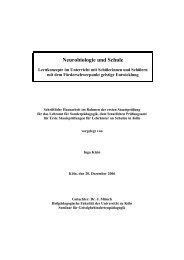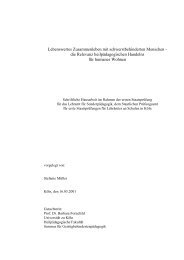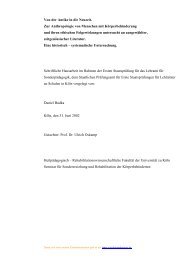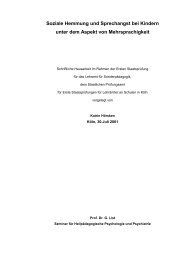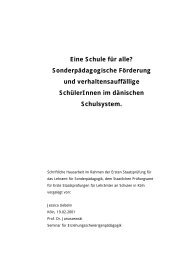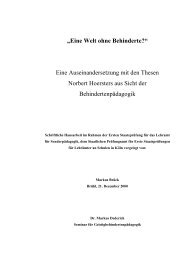Heilpädagogik online - sonderpaedagoge.de!
Heilpädagogik online - sonderpaedagoge.de!
Heilpädagogik online - sonderpaedagoge.de!
Sie wollen auch ein ePaper? Erhöhen Sie die Reichweite Ihrer Titel.
YUMPU macht aus Druck-PDFs automatisch weboptimierte ePaper, die Google liebt.
American Pragmatism, Sociology and the Development of Disability Studies<br />
William JAMES placed a different emphasis on pragmatism than did<br />
PIERCE. JAMES stressed praxis, the practical consequences of<br />
believing in a particular concept or social policy. In discussing the<br />
complexities of metaphysical and moral questions, he says, for<br />
example: “The pragmatic method in such cases is to try to<br />
interpret each notion by tracing its respective practical consequences”<br />
(JAMES 1907:28). JAMES also recognized that there<br />
might not be scientific evi<strong>de</strong>nce to settle every dispute. Therefore,<br />
he posited that “religious beliefs” which in principle cannot be<br />
verified or falsified are often used to make <strong>de</strong>cisions because they<br />
fit with the believer’s life and have practical consequences. He also<br />
supported the notion that truth is socially constructed and can<br />
change over time. Both his emphasis on “religious beliefs” and the<br />
social construction of truth acknowledge the subjective and relative<br />
aspects of knowledge. JAMES’ brand of pragmatism opens the door<br />
to later explorations of the subjective meanings of experience.<br />
John DEWEY and F.C.S. SCHILLER moved pragmatism in an<br />
increasingly activist direction. DEWEY did not engage in the “quest<br />
for certainty” that captured the attention of PIERCE. Instead, he<br />
recognized that knowing is intimately related to practice (DEWEY<br />
1910). He was a reformist in that he advocated that good theories<br />
are based in practice and are modified as experience with a<br />
program <strong>de</strong>monstrates the success or failure of an i<strong>de</strong>a. SCHILLER<br />
(1864-1937) is more revolutionary than DEWEY. He acknowledges<br />
the social construction of reality by arguing that truth is relative<br />
and means “valued by us.” A proposition is true if it “forwards our<br />
ends” (SCHILLER 1907: 8). In terms of social activism, SCHILLER<br />
pointed out how values and subjective experience color what we<br />
think of as being true or right.<br />
- 26 -<br />
Heilpädagogik <strong>online</strong> 03/ 03



